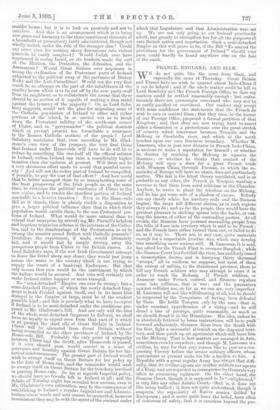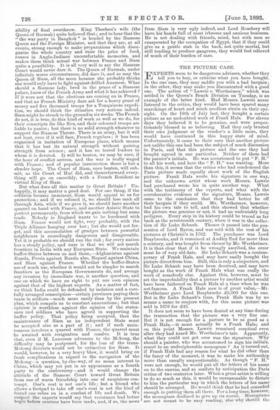FRANCE, ENGLAND, AND SIAM.
WE do not quite like the news from Siam, and especially the news of Thursday. Great Britain and France have no wish to quarrel about Indo-China it it can be helped ; and if the whole matter could be left tO Lord Rosebery and the French Foreign Office, we dare say matters could be settled reasonably enough ; but unfor- tunately there are personages concerned who may not Lai so easily pacified. or convinced. Our readers may accept with some confidence the statements that the French do wish to own or control Siam ; that they once, to the horrer of our Foreign Office, proposed a formal partition of that Kingdom ; and. that they are now trying hard to assert either a dominion or a protectorate over the great stretch of country which intervenes between Tonquin and. the Mekong or Cambodia river, and which at the north touches upon our own Burmese boundary. Whether K. Lanessan, who is just now dictator in French Indo-China, is anxious to make a reputation for himself ; or whether he desires by reaching the Mekong to squeeze the Siamese ; or whether he thinks that control of the Mekong will open a door for a great French trade with Western China through Yunnan, in which the re- mainder of Europe will have no share, does not particularly matter. The last is the latest theory ventilated, and is as probable as any other, the French in Tonquin wanting a revenue to free them from acrid criticism in the Chamber. Anyhow, he wants to plant the tricolour on the Mekong; and he has got some sort of a shadow of excuse. Nobody can say clearly where his territory ends and the Siamese begins ; the maps tell different stories, as in such regions they always do ; and as for the people, they would have the greatest pleasure in sticking spears into the backs, or cut- ting the sinews, of either of the contending parties. At all events, the Siamese have pursued marauding people from the hills of Laos into territory which is said to be French ; and. the French have either turned. them out, or failed to do so, as it may be. There are, in any case, quite materials enough for a respectable frontier war, -which may develop into something more serious still. M. Lanessan, it is said, has asked for the French Fleet to overawe Bangkok ; while the Siamese Court has fortified the river, has suddenlyissued a conscription decree, and is hurrying thirty thousand "troops," all in uniform we suppose, but most of them the rawest of militia, to the threatened province, there to kill any French soldiers who may attempt to cross it in order to reach the Mekong. If French soldiers, or Anamese under French control, and. Siamese regulars come into collision, that is war ; and the guarantees against collision are, so far as we can see, very imperfect. M. Lanessan will not like withdrawing at all, lest he should be suspected by the Tonquinese of having been defeated by Siam. He holds Tonquin only by the ears—that is, under constant apprehension of a rising—and he will dread a loss of prestige, quite reasonably, as much as we should dread it in the Himalayas. His idea, unless he is absolutely fettered by home instructions, will be to push forward audaciously, threaten Siam from the South with his fleet, fight a successful skirmish on the disputed terri- tory, and then patch up an agreement which will leave him on the Mekong. That is how matters are managed in Asia, sometimes even by ourselves ; and though M. Lanessan it a civilian, he may for that very reason like to pose as a con- quering Viceroy before the senior military officers, whose pretensions at present make his life a burden to him. A Republic with a great regular Army has always that diffi. culty, that its civilian agents are neither soldiers nor agents of a King, and are regarded in Consequence by Generals very often as presuming nuisances. On the other hand, the Siamese Court, though it is supposed to be" enlightened," is very like any other Asiatic Court,—that is, it does not like being bullied ; it does not quite understand, though it suspects, the superiority of Native armies drilled by Europeans ; and it never quite loses the belief, born often of centuries of safety, that it is somehow beyond the pos- sibility of final overthrow. King Theebau's wife (the Queen of Burmah) quite believed that ; and to hear that the "the war party in Bangkok" is headed by the Siamese Queen and the Foreign Minister, and that they, are, at all events, strong enough to make preparations which disor- ganise the whole country and raise the price of food, rouses in Anglo-Indians uncomfortable memories, and makes them think actual war between France and Siam quite a possibility. It is all very well to say the Siamese Court would never dare it. The Queen of Burmah, under infinitely worse circumstances, did dare it, and so may the Queen of Siam, all the more because she probably thinks she would only have to fight against drilled Anamese. What should a Siamese lady, bred in the peace of a Siamese palace, know of the French Army and what it has achieved ? If it were not that the elections are coming on in France, and that no French Ministry dare ask for a heavy grant of money and five thousand troops for a Tonquinese expedi- tion, we should think the situation very serious indeed. Siam might be struck to the ground in six weeks. The French do not, it is true, do this kind of work as well as we do, for their conscripts die like flies, and their coloured troops are liable to panics ; but there is no solid strength whatever to ,support the Siamese Throne. There is an army, but it will not beat, even if it will face, French regulars ; it has been .organised in imitation of European plans, which means that it has lost its natural strength without gaining strength from science ; and it has no tested leaders to whom it is devoted. It will be beaten, we may be sure, if the hour of conflict arrives, and the war is really waged with France ; and of popular insurrection there is but a slender hope. The Court of Siam, once beaten, will sub- emit, as the Court of Ha did, and thenceforward every- thing will go on smoothly, with a French Resident as 'virtual King of Siam. But what does all this matter to Great Britain ? Un- happily, it may matter a good deal. For one thing, if the -collision became imminent, Siam would appeal to us for protection ; and if we refused it, we should lose rank all through Asia, while if we gave it, we should have another • quarrel on hand with France, and another Asiatic State to protect permanently, from which we gain nothing but some trade. Nobody in England wants to be burdened with Siam. France would not fight, very probably, with the Triple Alliance hanging over her ; but she would not for- get, and this accumulation of grudges between powerful neighbours is exceedingly dangerous and disagreeable. Yet it is probable we should run the risk ; for every nation has a steady policy, and ours is that we will not march frontiers in India with any European State. We maintain buffer-States between us and them,—Afghanistan against Russia, Persia against Russia also, Nepaul against China, • and Siam against France. Whether the buffer-States are of much use, whether it would not be simpler to march frontiers as the European Governments do, and avenge any invasion by immediate war, is another question, and one on which we have no right to put our own opinion against that of the highest experts. As a matter of fact, we think India could be defended by isolation and a care- fully arranged conscription—certain provinces paying their taxes in soldiers—much more easily than. by the present plan, which compels us to constant annexations ; but that • opinion is worthless against the opinion of the states- men and soldiers who have agreed in supporting the • buffer policy. That policy being accepted, then the ,maintenance of Siam as an independent State must be accepted also as a part of it ; and if such main- tenance involves a quarrel with France, the quarrel must be awaited with resignation and resolve. It is true 'that, even if M. Lanessan advances to the Mekong, the difficulty may be postponed, for the loss of the trans. Mekong districts would not be extinction for Siam. It would, however, be a very heavy blow, it would bring on fresh complications in regard to the navigation of the Mekong—a question, by-the-way, of no mean interest to 'China, which may yet put in an appearance as a fourth party to the controversy—and it would change the attitude of the Siamese Court toward Great Britain from one of warm friendship into one of suspicious con- tempt. One's coat is not one's life ; but a friend who allows a footpad to take off one's coat is not the kind of friend one relies on in a combat of life and death, We suspect the experts would say that resistance had better begin before cessions have been made, and, if so, the news from Siam is very ugly indeed, and Lord Rosebery will have his hands full of most irksome and anxious business. He is not dealing with friends, mind, but with men so exasperated by the occupation of Egypt, that if they could give us a gentle stab in the back, not quite mortal, but still tending to produce gangrene, they would feel relieved of much of their burden of care.







































 Previous page
Previous page